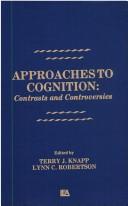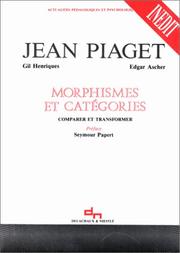| Listing 1 - 10 of 383 | << page >> |
Sort by
|
Book
Abstract | Keywords | Export | Availability | Bookmark
 Loading...
Loading...Choose an application
- Reference Manager
- EndNote
- RefWorks (Direct export to RefWorks)
Rehabilitation of cognitive functions is a primary goal in neurological and psychiatric settings. Cognitive treatments include individual and group exercises, as well as the use of computer programs and virtual reality. Besides, ongoing studies have been examining the clinical usefulness of non-invasive cerebral cortex stimulation in increasing the efficacy of cognitive protocols. Cognitive rehabilitation is based on neuroplasticity and affects brain morphological and physiological responses by integration of behavioral and cognitive changes. The brain correlates of rehabilitation-induced modifications can be investigated through magnetic resonance imaging, both at structural and functional macro-levels. Animal research can integrate such information providing data on axonal regrowth and reshaping of synaptic connectivity in response to treatment. Animal models of neurological and psychiatric conditions have been developed, and preclinical test batteries for the assessment of cognitive functions in animal models of such conditions have been created. The question is then: how does rehabilitation drive reorganization at the neuronal level? The focus of this Research Topic is on rehabilitation-induced cognitive and neural plasticity in adult humans and animal models. The goal is to provide an integrated picture highlighting what techniques have been proven to be effective.
Neuroimaging --- Brain Stimulation --- cerebral plasticity --- cognitive functions --- training --- Rehabilitation
Book
Abstract | Keywords | Export | Availability | Bookmark
 Loading...
Loading...Choose an application
- Reference Manager
- EndNote
- RefWorks (Direct export to RefWorks)
Rehabilitation of cognitive functions is a primary goal in neurological and psychiatric settings. Cognitive treatments include individual and group exercises, as well as the use of computer programs and virtual reality. Besides, ongoing studies have been examining the clinical usefulness of non-invasive cerebral cortex stimulation in increasing the efficacy of cognitive protocols. Cognitive rehabilitation is based on neuroplasticity and affects brain morphological and physiological responses by integration of behavioral and cognitive changes. The brain correlates of rehabilitation-induced modifications can be investigated through magnetic resonance imaging, both at structural and functional macro-levels. Animal research can integrate such information providing data on axonal regrowth and reshaping of synaptic connectivity in response to treatment. Animal models of neurological and psychiatric conditions have been developed, and preclinical test batteries for the assessment of cognitive functions in animal models of such conditions have been created. The question is then: how does rehabilitation drive reorganization at the neuronal level? The focus of this Research Topic is on rehabilitation-induced cognitive and neural plasticity in adult humans and animal models. The goal is to provide an integrated picture highlighting what techniques have been proven to be effective.
Neuroimaging --- Brain Stimulation --- cerebral plasticity --- cognitive functions --- training --- Rehabilitation
Book
Abstract | Keywords | Export | Availability | Bookmark
 Loading...
Loading...Choose an application
- Reference Manager
- EndNote
- RefWorks (Direct export to RefWorks)
Rehabilitation of cognitive functions is a primary goal in neurological and psychiatric settings. Cognitive treatments include individual and group exercises, as well as the use of computer programs and virtual reality. Besides, ongoing studies have been examining the clinical usefulness of non-invasive cerebral cortex stimulation in increasing the efficacy of cognitive protocols. Cognitive rehabilitation is based on neuroplasticity and affects brain morphological and physiological responses by integration of behavioral and cognitive changes. The brain correlates of rehabilitation-induced modifications can be investigated through magnetic resonance imaging, both at structural and functional macro-levels. Animal research can integrate such information providing data on axonal regrowth and reshaping of synaptic connectivity in response to treatment. Animal models of neurological and psychiatric conditions have been developed, and preclinical test batteries for the assessment of cognitive functions in animal models of such conditions have been created. The question is then: how does rehabilitation drive reorganization at the neuronal level? The focus of this Research Topic is on rehabilitation-induced cognitive and neural plasticity in adult humans and animal models. The goal is to provide an integrated picture highlighting what techniques have been proven to be effective.
Neuroimaging --- Brain Stimulation --- cerebral plasticity --- cognitive functions --- training --- Rehabilitation --- Neuroimaging --- Brain Stimulation --- cerebral plasticity --- cognitive functions --- training --- Rehabilitation

ISBN: 0898596238 Year: 1986 Publisher: Hillsdale Erlbaum
Abstract | Keywords | Export | Availability | Bookmark
 Loading...
Loading...Choose an application
- Reference Manager
- EndNote
- RefWorks (Direct export to RefWorks)
Cognition --- Cognition. --- Psychology --- Cognitive Function --- Cognitions --- Cognitive Functions --- Function, Cognitive --- Functions, Cognitive
Book
ISBN: 0470925507 Year: 1981 Publisher: Hillsdale (N.J.) : Erlbaum,
Abstract | Keywords | Export | Availability | Bookmark
 Loading...
Loading...Choose an application
- Reference Manager
- EndNote
- RefWorks (Direct export to RefWorks)
Cognition. --- Cognition --- Psycholinguistics --- Psychology --- Psycholinguistic --- Cognitive Function --- Cognitions --- Cognitive Functions --- Function, Cognitive --- Functions, Cognitive --- Psycholinguistics.
Book
Year: 2019 Publisher: Frontiers Media SA
Abstract | Keywords | Export | Availability | Bookmark
 Loading...
Loading...Choose an application
- Reference Manager
- EndNote
- RefWorks (Direct export to RefWorks)
This eBook is a collection of articles from a Frontiers Research Topic. Frontiers Research Topics are very popular trademarks of the Frontiers Journals Series: they are collections of at least ten articles, all centered on a particular subject. With their unique mix of varied contributions from Original Research to Review Articles, Frontiers Research Topics unify the most influential researchers, the latest key findings and historical advances in a hot research area! Find out more on how to host your own Frontiers Research Topic or contribute to one as an author by contacting the Frontiers Editorial Office: frontiersin.org/about/contact
cognitive functions --- working memory --- BCI (Brain Computer Interface) --- EEG --- fNIRS (functional near infrared spectroscopy) --- Cognitive Processes
Dissertation
Year: 2022 Publisher: Liège Université de Liège (ULiège)
Abstract | Keywords | Export | Availability | Bookmark
 Loading...
Loading...Choose an application
- Reference Manager
- EndNote
- RefWorks (Direct export to RefWorks)
This feasibility and neurophysiological study aims to compare the effects of four types of stimulation - tDCS combined with music, tDCS combined with white noise, music alone (sham tDCS), white noise alone (sham tDCS) – on cognitive and neurophysiological outcomes in healthy participants, with the hypothesis that tDCS and music combined might improve cognitive functions (tested with the Stroop test and the 3-back test) compared to the other conditions, and thus, could be tested as a therapeutic option for patients with altered states of consciousness in the future. This study shows that in healthy subjects, a single session of tDCS combined with music does not increase cognitive functions, as hypothesized. Nonetheless, using music alone instead seems to be promising for increasing brain activity related to cognitive performances by means of an increase in frequencies associated with cognition. Even if the results might be promising, they come from a relatively small sample of 23 subjects and might not be sufficient to represent the general population.
Book
Year: 2019 Publisher: Frontiers Media SA
Abstract | Keywords | Export | Availability | Bookmark
 Loading...
Loading...Choose an application
- Reference Manager
- EndNote
- RefWorks (Direct export to RefWorks)
This eBook is a collection of articles from a Frontiers Research Topic. Frontiers Research Topics are very popular trademarks of the Frontiers Journals Series: they are collections of at least ten articles, all centered on a particular subject. With their unique mix of varied contributions from Original Research to Review Articles, Frontiers Research Topics unify the most influential researchers, the latest key findings and historical advances in a hot research area! Find out more on how to host your own Frontiers Research Topic or contribute to one as an author by contacting the Frontiers Editorial Office: frontiersin.org/about/contact
Science: general issues --- Neurosciences --- cognitive functions --- working memory --- BCI (Brain Computer Interface) --- EEG --- fNIRS (functional near infrared spectroscopy) --- Cognitive Processes --- cognitive functions --- working memory --- BCI (Brain Computer Interface) --- EEG --- fNIRS (functional near infrared spectroscopy) --- Cognitive Processes
Book
ISBN: 0444892206 Year: 1992 Publisher: Amsterdam North-Holland
Abstract | Keywords | Export | Availability | Bookmark
 Loading...
Loading...Choose an application
- Reference Manager
- EndNote
- RefWorks (Direct export to RefWorks)
Cognitive psychology --- Cognition --- Congresses --- Congrès --- Cognition. --- -Psychology --- Cognitive Function --- Cognitions --- Cognitive Functions --- Function, Cognitive --- Functions, Cognitive --- -Congresses --- Congrès

ISBN: 2603007408 9782603007402 Year: 1990 Volume: vol *3 Publisher: Neuchâtel : Delachaux et Niestlé,
Abstract | Keywords | Export | Availability | Bookmark
 Loading...
Loading...Choose an application
- Reference Manager
- EndNote
- RefWorks (Direct export to RefWorks)
Cognition. --- Cognitive Function --- Cognitions --- Cognitive Functions --- Function, Cognitive --- Functions, Cognitive --- Cognition --- Genetic epistemology. --- Categories (Mathematics) --- Cognition in children.
| Listing 1 - 10 of 383 | << page >> |
Sort by
|

 Search
Search Feedback
Feedback About UniCat
About UniCat  Help
Help News
News